When we run certain commands in Unix/Linux to read or edit text from a string or file, we most times try to filter output to a given section of interest. This is where using regular expressions comes in handy.
Read Also: 10 Useful Linux Chaining Operators with Practical Examples
What are Regular Expressions?
A regular expression can be defined as a strings that represent several sequence of characters. One of the most important things about regular expressions is that they allow you to filter the output of a command or file, edit a section of a text or configuration file and so on.
Features of Regular Expression
Regular expressions are made of:
- Ordinary characters such as space, underscore(_), A-Z, a-z, 0-9.
- Meta characters that are expanded to ordinary characters, they include:
(.)it matches any single character except a newline.(*)it matches zero or more existences of the immediate character preceding it.[ character(s) ]it matches any one of the characters specified in character(s), one can also use a hyphen(-)to mean a range of characters such as[a-f],[1-5], and so on.^it matches the beginning of a line in a file.$matches the end of line in a file.\it is an escape character.
In order to filter text, one has to use a text filtering tool such as awk. You can think of awk as a programming language of its own. But for the scope of this guide to using awk, we shall cover it as a simple command line filtering tool.
The general syntax of awk is:
# awk 'script' filename
Where 'script' is a set of commands that are understood by awk and are execute on file, filename.
It works by reading a given line in the file, makes a copy of the line and then executes the script on the line. This is repeated on all the lines in the file.
The 'script' is in the form '/pattern/ action' where pattern is a regular expression and the action is what awk will do when it finds the given pattern in a line.
How to Use Awk Filtering Tool in Linux
In the following examples, we shall focus on the meta characters that we discussed above under the features of awk.
A simple example of using awk:
The example below prints all the lines in the file /etc/hosts since no pattern is given.
# awk '//{print}'/etc/hosts
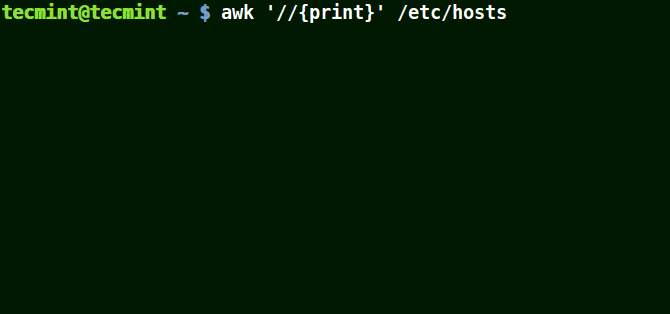
Use Awk with Pattern:
I the example below, a pattern localhost has been given, so awk will match line having localhost in the /etc/hosts file.
# awk '/localhost/{print}' /etc/hosts

Using Awk with (.) wild card in a Pattern
The (.) will match strings containing loc, localhost, localnet in the example below.
That is to say * l some_single_character c *.
# awk '/l.c/{print}' /etc/hosts

Using Awk with (*) Character in a Pattern
It will match strings containing localhost, localnet, lines, capable, as in the example below:
# awk '/l*c/{print}' /etc/localhost
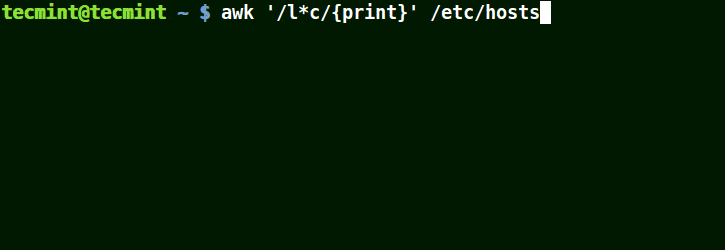
You will also realize that (*) tries to a get you the longest match possible it can detect.
Let look at a case that demonstrates this, take the regular expression t*t which means match strings that start with letter t and end with t in the line below:
this is tecmint, where you get the best good tutorials, how to's, guides, tecmint.
You will get the following possibilities when you use the pattern /t*t/:
this is t this is tecmint this is tecmint, where you get t this is tecmint, where you get the best good t this is tecmint, where you get the best good tutorials, how t this is tecmint, where you get the best good tutorials, how tos, guides, t this is tecmint, where you get the best good tutorials, how tos, guides, tecmint
And (*) in /t*t/ wild card character allows awk to choose the the last option:
this is tecmint, where you get the best good tutorials, how to's, guides, tecmint
Using Awk with set [ character(s) ]
Take for example the set [al1], here awk will match all strings containing character a or l or 1 in a line in the file /etc/hosts.
# awk '/[al1]/{print}' /etc/hosts
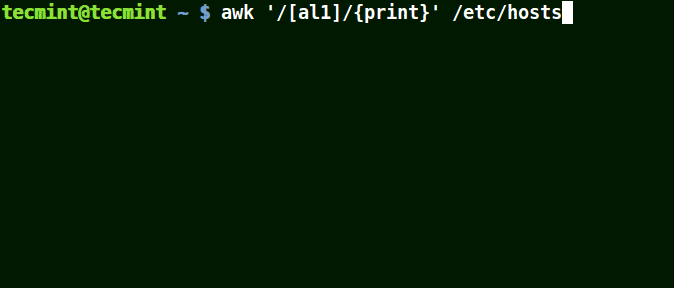
The next example matches strings starting with either K or k followed by T:
# awk '/[Kk]T/{print}' /etc/hosts

Specifying Characters in a Range
Understand characters with awk:
[0-9]means a single number[a-z]means match a single lower case letter[A-Z]means match a single upper case letter[a-zA-Z]means match a single letter[a-zA-Z 0-9]means match a single letter or number
Lets look at an example below:
# awk '/[0-9]/{print}' /etc/hosts
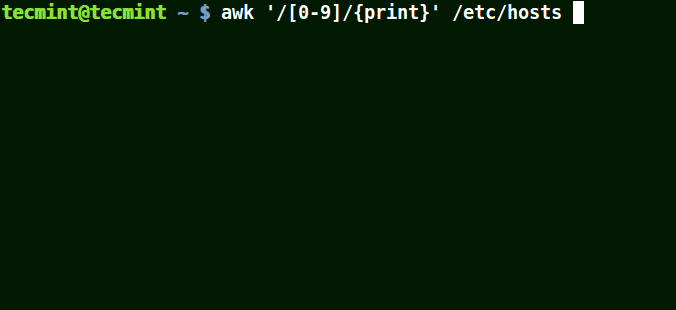
All the line from the file /etc/hosts contain at least a single number [0-9] in the above example.
Use Awk with (^) Meta Character
It matches all the lines that start with the pattern provided as in the example below:
# awk '/^fe/{print}' /etc/hosts
# awk '/^ff/{print}' /etc/hosts

Use Awk with ($) Meta Character
It matches all the lines that end with the pattern provided:
# awk '/ab$/{print}' /etc/hosts
# awk '/ost$/{print}' /etc/hosts
# awk '/rs$/{print}' /etc/hosts

Use Awk with (\) Escape Character
It allows you to take the character following it as a literal that is to say consider it just as it is.
In the example below, the first command prints out all line in the file, the second command prints out nothing because I want to match a line that has $25.00, but no escape character is used.
The third command is correct since a an escape character has been used to read $ as it is.
# awk '//{print}' deals.txt
# awk '/$25.00/{print}' deals.txt
# awk '/\$25.00/{print}' deals.txt
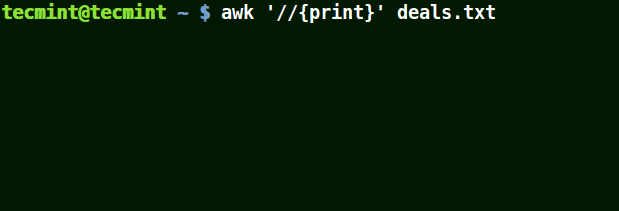
Summary
That is not all with the awk command line filtering tool, the examples above a the basic operations of awk. In the next parts we shall be advancing on how to use complex features of awk. Thanks for reading through and for any additions or clarifications, post a comment in the comments section.

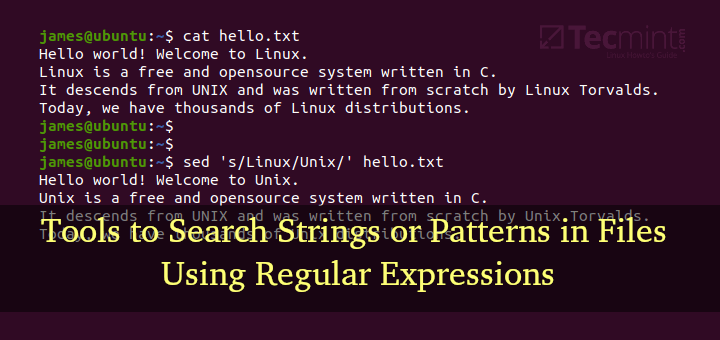


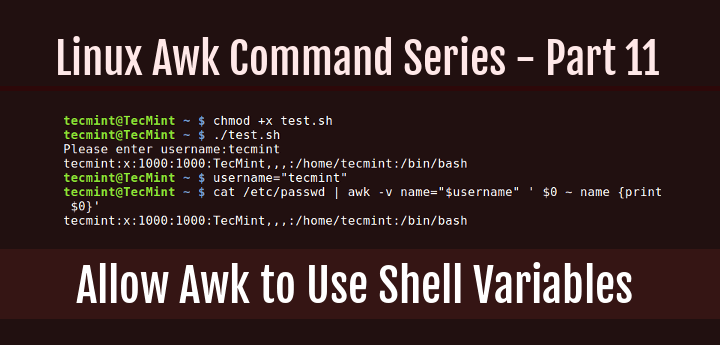


This is wonderful tutorial and very well illustrated.
There is a minor error in the explanations on what asterisk
(*)means in regular expressions — it means ‘match the previous character zero or more times‘. For example'p*'will match the letter ‘p’ zero or more times, thus this expression will match anything and everything because it will be looking for the letter ‘p’ to be contained zero or more times — and absolutely any text contains the letter ‘p’ either zero or more times.For this reason asterisk is never used with just a single symbol before it, it must be used in an expression with more symbols inside it, like
/A-*B/, which will match “A” followed by zero or more hyphens"-"and then followed by “B”, thus the following strings will produce a match “AB” (this has zero occurrences of ‘-‘), “A-B”, “A–B”, “A—B” and so on.Note that the text presented in this tutorial erroneously suggests that
/A-*B/will not match “AB” when a simple check in AWK shows that it is matching it (in fact a test in any REGEXP application will show the same result, e.g. egrep).For this reason this tutorial interprets somewhat erroneously the result of:
# awk '/l*c/{print}' /etc/localhostThe above will match all lines that contain the letter ‘c’ regardless whether they contain the letter ‘l’ or not. This is because
/l*/means ‘match letter l zero or more times‘, so/l*c/means ‘match letter c preceded by zero or more occurrences of letter l‘, but any line that contains the letter c in it also contain zero or more letters l in front of it — the key to understanding this is “ZERO or more times“.CONCLUSION: In REGEXP the asterisk symbol
(*)does not mean the same thing as in Microsoft Windows and DOS/CMD file-name matching, it does not match any character (as this tutorial erroneously suggests), it matches the preceding character ZERO or more times.I’m struggling to make my script work. I have a huge file and each line needs to be searched for the string “WAP” and then, when found, the character appearing two characters BEFORE the string needs to be returned. Can you help me simplify this?
“Using Awk with
(*)Character in a PatternIt will match strings containing localhost, localnet, lines, capable, as in the example below:”
I think capable not match, but the whole line.
@ROBSON
Yes, this is true, it matches the whole line.
Amazing tutorial , thanks a lot, I have a question.
I have a file (testFile) with the following content:
I’m running this command as a test where after looking for the pattern I want a message telling me wheter or not it found matches .
awk ‘/^z/{print} {if (NR == 0) {print “No matches found”} else {print “There are matches”} }’ testFile
Since there are no lines matching the pattern, I’m expecting the “No matches found” message, but it shows “There are matches“.
HI,
Can you please provide the script details further, if possible
Thanks & Regards,
Mithran